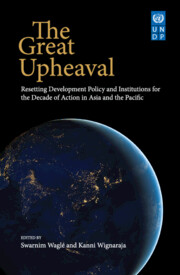Book contents
- Frontmatter
- Contents
- List of Figures
- List of Tables
- List of Boxes
- List of Appendices
- List of Abbreviations
- Foreword
- Acknowledgements
- Introduction
- 1 Aligning Sovereign Debt Financing with Climate Action in the Asia-Pacific Region
- 2 Melting Glaciers, Threatened Livelihoods: Confronting Climate Change to Save the Third Pole
- 3 Accelerating Universal Digital Connectivity
- 4 The Post-COVID-19 Future for Global Value Chains
- 5 Is Southeast Asia Falling into a Latin American–Style Middle-Income Trap?
- 6 Equality of Opportunity as a Measure of Development
- 7 Insights for Policymaking from the Multidimensional Poverty Index
- 8 COVID-19 and Human Security
- 9 Making COVID-19 Vaccine Universally Accessible
- 10 Enhancing the Provision of Global Public Goods: Ready for More Realism?
- 11 Asian-Pacific Regional Cooperation in the Post-COVID-19 Era
- 12 Pandemic Governance and Human Development: Early Lessons from Asia
- 13 Seven Lessons for Development Policy from the COVID-19 Pandemic
- About the Contributors
- Index
Introduction
Published online by Cambridge University Press: 28 February 2022
- Frontmatter
- Contents
- List of Figures
- List of Tables
- List of Boxes
- List of Appendices
- List of Abbreviations
- Foreword
- Acknowledgements
- Introduction
- 1 Aligning Sovereign Debt Financing with Climate Action in the Asia-Pacific Region
- 2 Melting Glaciers, Threatened Livelihoods: Confronting Climate Change to Save the Third Pole
- 3 Accelerating Universal Digital Connectivity
- 4 The Post-COVID-19 Future for Global Value Chains
- 5 Is Southeast Asia Falling into a Latin American–Style Middle-Income Trap?
- 6 Equality of Opportunity as a Measure of Development
- 7 Insights for Policymaking from the Multidimensional Poverty Index
- 8 COVID-19 and Human Security
- 9 Making COVID-19 Vaccine Universally Accessible
- 10 Enhancing the Provision of Global Public Goods: Ready for More Realism?
- 11 Asian-Pacific Regional Cooperation in the Post-COVID-19 Era
- 12 Pandemic Governance and Human Development: Early Lessons from Asia
- 13 Seven Lessons for Development Policy from the COVID-19 Pandemic
- About the Contributors
- Index
Summary
The years 2020 and 2021 gave us a glimpse of the universe of complex development policy issues we will likely deal with in this century – issues unprecedented in scale and unpredictability. Let us begin with three vignettes that have profound implications for the themes covered in this volume.
First, the year 2020 marked a momentous tipping point from a planetary perspective. For the first time in the 4.5-billion-year history of the Earth, the weight of human-made materials will likely exceed that of all life on the planet. Artificial materials, such as metals, concrete, bricks and plastic now outweigh the biomass of all living plants and animals (Elhacham et al., 2020). Specifically, this is a once-in-an-epoch event where the anthropogenic artificial mass will exceed the trillion tons (1.1 teraton) of living biomass. The United Nations Development Programme's (UNDP) 2020 Human Development Report explains the costs of such effects and details the enormous pressure we have placed on our fragile planet (UNDP, 2020). We may indeed be exiting the Holocene lasting the past 12,000 years, and entering the Anthropocene, a proposed geologic epoch in which humans have become the dominant force shaping the Earth (not the other way round).
Second, partly as a result of human squeezing and straining of local ecosystems, livestock and wildlife, an unfamiliar cellular microbe triggered the COVID-19 pandemic. Over five million people have died and the global economy lost at least US$10 trillion in unrealized output in 2020 alone (The Economist, 2021). Further economic damage and collateral social and health costs will continue to accumulate, as will the pandemic's impact on stretched state capacities and governance.
Third, the year 2020 marks a decisive shift in global geopolitics. The ‘Rebalance’ has accelerated, with countries of the Asia-Pacific now accounting for close to half of world output (a phenomenon last seen before the Industrial Revolution). In this regard, many economic historians see the past two centuries as a ‘detour’ for Asia, but a major difference exists between the pre-industrial era of Asian dominance and the present (Maddison, 2007; UNDP, 2013). Throughout human history until the 19th century, the average annual economic growth rate, rounded down to one decimal place, stood at zero.
- Type
- Chapter
- Information
- The Great UpheavalResetting Development Policy and Institutions in the Asia-Pacific, pp. 1 - 8Publisher: Cambridge University PressPrint publication year: 2022



